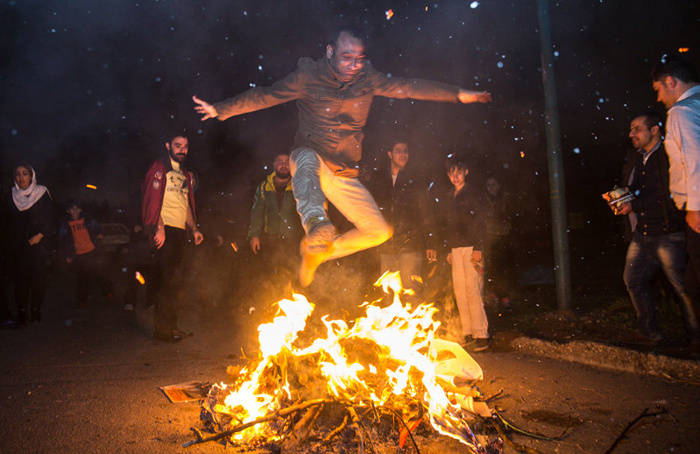Iran Jumping Over Fire to Shed Fears

Hessam Emami
Iranians are considering a campaign to boycott a festival, traditionally held on the eve of the last Wednesday every year, in fear of juvenile fatalities.
Chaharshanbe Suri, a festival of fire and one of the last legacies of the Zoroastrian era still widely believed and practiced in Iran, is losing stimulus as it has caused casualties and fatal injuries over the past few years in its increasingly violent modern form.
As a prelude to the Persian New Year, Nowruz, bonfires are lit in the streets and people jump over them to purify their souls and bodies and renew their energies for the coming year. Over the past two or three decades however, heavily loaded red lead grenades, chocolate bombs and explosive capsules, popularly believed to be imported from China, have claimed tens of lives. Constant tossing of these explosives into the streets in large cities has raised concerns over safety of the citizens as many people remain in their houses, while they stay away from their windows to shelter from the one-night stand mock civil war.
In 2005, the death of a thirteen-year-old boy from a family of celebrities turned many heads to the issue. Pouyan, son to famous soccer player and coach Hamid Alidoosti, was preparing for the celebration when a hand grenade went off to kill him instantly. His sister, now an internationally acclaimed actress Taraneh Alidousti, was on the scene for the movie “Charshanbeh Suri”, directed by Asghar Farhadi, when she heard the news.
Police warnings and measures have come short of putting an end to the profitable business behind the excitement. Just like in many similar cases, the people are being blamed and asked for abstinence. Iran’s police department has recently issued a statement offering recommendations for the people to help reduce injuries. The statement declares a ban on trading hazardous, explosive and flammable materials that “disturb the peace and discipline of the society”, pledging legal action against offenders. It also encourages celebration in alleys rather than in streets and advises parents to accompany their children, monitoring and controlling their conducts to prevent disastrous incidents. These come with a bombardment of state-sponsored ‘cultural ads’ on TV and streets alike. Even satellite TVs sponsored by the Iranian diaspora are doing their best to discourage people from risky celebrations. However, one needs just a five-minute walk in downtown Tehran to safely find and buy a full-fledged arsenal of non-standard explosives.
A spokesman of Iran’s Fire Department has also condemned the transition from a peaceful festival into a battlefield. Jalal Maleki says children aged 9 to 10 and young adults aged 11 to 22 are more exposed to the hazards of the festival, according to a study conducted on incidents that occurred last year. According to Khabar Online, he has also asked people to avoid starting fires in green spaces or roofed parking lots. “People would be better off if they avoid parking their cars in the streets,” he was quoted as saying by Khabar Online.
The Director General for the Treatment Department of Tehran Province’s Social Security Organization has also told reporters that the organization’s hospitals will be on emergency alert during the festival as well as New Year’s holidays.
The incidents in question have admittedly declined in numbers in recent years. However, there are still dreadful instances here and there. Last Wednesday, a massive explosion in Islamshahr, the second most populated city in the province and 30 kilometers southwest of Tehran, demolished a four-story residential building in which one was killed and six were injured. Some 50 kg of explosives were stored in the house, according to Mehr News Agency.
Two weeks ago, popular Iranian actor Parviz Parastouei posted a message on his Instagram, encouraging people to stop wasting their money on ‘Chinese’ firecrackers, an epitome of economic infiltration but from the orient. Emphasizing the Iranian origin of the celebration, he urged a revival of other rituals such as Ghashogh-Zani and food offerings during the one-day festival. With the safety concerns in the air, the campaign seems to be more influential than the entire official buzz.
The self-blamers that they are, Iranians are joining the initiative in an attempt to integrate the wish to preserve historical heritage with the duty to maintain the safety of their children.

